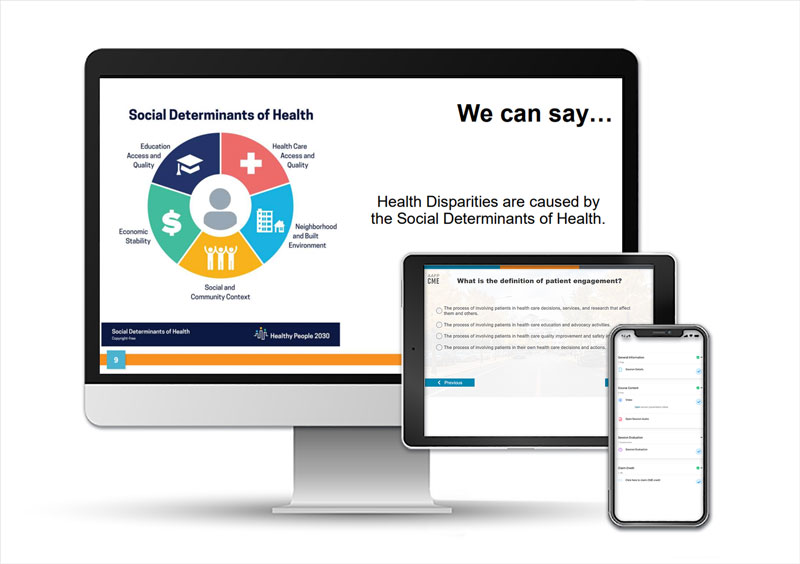Identify and Address Barriers to Health Equity

The EveryONE Project
With a focus on workforce diversity, education, advocacy, and forging partnerships with medical and non-medical organizations in your community, the project priorities for the EveryONE Project empower you to bring about equity for not just patients — but also for doctors and their practice staff.
The evidence-based toolkits and resources on these pages walk you through the process of learning about your patients' communities and the social influences on their health, highlighting leadership methods and ways you can engage in advocacy.

CME: Health Equity for EveryONE
Explore what true equitable and inclusive care can look like in your practice and incorporate strategies your entire care team can use to help everyone you encounter feel recognized and welcome.
This expanded learning activity will help you better appreciate what a non-inclusive patient experience might look like and why certain groups feel isolated, resulting in a less-than-optimal patient-doctor relationship.
Inside Family Medicine Podcast: CME | Cultural Competence in Healthcare Delivery
The CME on the Go series of the Inside Family Medicine podcast lets you earn up to 0.5 CME credits per episode — join the hosts as they explore cultural competency beyond mandatory training modules, discussing real-world applications that improve patient care. Through personal anecdotes and insightful discussion, they uncover how open-mindedness, humility, and flexibility create meaningful doctor-patient relationships.
Cultural competency is more than a box to check—it's an ongoing journey of understanding, adaptation, and empathy in patient care. In this episode, our co-hosts look at real-life experiences that highlight the importance of cultural awareness in both rural and urban medical settings. They discuss how recognizing cultural differences can shape treatment plans, improve patient trust, and ultimately lead to better health outcomes. From navigating language barriers with interpreters to addressing biases and ethical dilemmas, the conversation sheds light on the complexities of delivering truly patient-centered care. Tune in for a thought-provoking discussion that challenges assumptions and encourages a lifelong commitment to learning and growth in family medicine.
Members in Action
IMG Leader Eager to Represent Peers at NCCL
As a woman, minority and new physician, Shruti Javali, M.D., had plenty of options when pondering leadership roles at the AAFP’s National Conference of Constituency Leaders. But there was little doubt which group the Saba University School of Medicine graduate wanted to lead.
Q&A: ‘There’s No Place Better’ to Prepare You to Lead Than NCCL
Three current members of the Academy’s Board of Directors who previously served as NCCL conveners recently spoke with AAFP News about how the event shaped their leadership journey and why they encourage others to attend the April 24-26 event in Kansas City, Missouri.
CDEI-FM Chair: Goal to Improve Health Outcomes for All
AAFP News talked with former Academy President and current DEI-FM Commission Chair Ada Stewart, M.D., FAAFP and commission member Adena Hicks, M.A., M.P.H., M.D., about the Commission’s accomplishments and importance, and to clarify misconceptions about DEI.
Improving the Patient Experience
FPM, a peer-reviewed journal published by AAFP delved into the importance of a patient's experience with their care, and how to address the biggest issues that create patient dissatisfaction or frustration.
- Screening for Social Determinants of Health in Daily Practice: Social factors often have greater influence on patients' health than medical care. Identifying those factors is the first step to addressing them.
- Overcoming Barriers of Distrust: Whether distrust stems from discrimination or other negative experiences, “Seek first to understand.”
- What Do Patients Want?: “Patient satisfaction” is the measure of how well the entire experience met patients' expectations. Was the clinic warm and welcoming? Did they feel listened to and cared for?
.png)